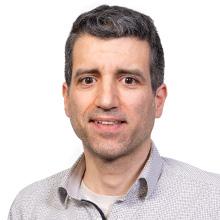
Julio Saez Rodriguez
Head of Research
saez [at] ebi.ac.uk
ORCID: 0000-0002-8552-8976
EditSystems biomedicine

Head of Research
saez [at] ebi.ac.uk
ORCID: 0000-0002-8552-8976
EditOur main website is https://saezlab.org/. Please look there for the most up to date information on our work.
Our research is application-driven and tailored towards producing computational models that integrate diverse data sources to better understand and treat diseases. Because of this, we collaborate closely with experimental groups. A major emphasis is to build context-specific models that are both mechanistic (to provide understanding) and predictive (to generate novel hypotheses). To build these models, we combine existing biochemical knowledge with different types of large scale data. We believe that this biological knowledge can be instrumental to move from pure correlation to causation in large data sets, and thereby identify the molecular processes that underlie specific phenomena.
We develop and apply methods to extract mechanistic features from diverse omics data, recently also for single-cell data. We then combine these multi-omics data sets into causal networks. Finally, we build dynamic models of specific subsystems using logic formalisms that we can analyze and simulate to predict the effect of new perturbations.
We apply these strategies in the context of many disease conditions. Particular areas of interest for us are cancer and fibrosis (in particular in kidney, heart, and liver). While our research is driven by applications, we develop open-source computational tools that share freely with the scientific community.
Finally, we support scientific crowdsourcing, specifically collaboratives competitions, through the DREAM challenges.
The group is based in two sites: EMBL-EBI and Heidelberg University.
